Kultur in Gefahr - ITI
Kultur in Gefahr - ITI
Kultur in Gefahr - ITI
Create successful ePaper yourself
Turn your PDF publications into a flip-book with our unique Google optimized e-Paper software.
22 Artistic Expression <strong>in</strong> a Corporate World<br />
Artistic Expression <strong>in</strong> a Corporate World 23<br />
After the failure – or success? – of Cancún this date is no longer a<br />
certa<strong>in</strong>ty. It may not be surpris<strong>in</strong>g that the issue of culture and trade is on<br />
the agenda aga<strong>in</strong>. Some countries have tabled so called communications<br />
on this issue at WTO, with Canada and the US at both ends of the scale.<br />
The Canadian communication stipulates, that ‘GATS cannot be <strong>in</strong>terpreted<br />
as requir<strong>in</strong>g governments to privatise or to deregulate any services. We<br />
recognize the right of <strong>in</strong>dividual countries to ma<strong>in</strong>ta<strong>in</strong> public services <strong>in</strong><br />
sectors of their choice. This is not a matter for the GATS negotiations.’ It<br />
is clear that Canada will not make any commitments that restrict its ability<br />
to achieve its cultural policy objectives ‘until a new <strong>in</strong>ternational<br />
<strong>in</strong>strument, designed specifically to safeguard the right of countries to<br />
promote and preserve their cultural diversity, can be established.’ 3<br />
The United States leaves beh<strong>in</strong>d what it calls the all-or-noth<strong>in</strong>g<br />
approach from 1993. ‘Some argue as if the only available options were to<br />
exclude culture from the WTO or to liberalize completely all aspects of<br />
audiovisual and related services.’ Such stark options obscure, accord<strong>in</strong>g<br />
to the US, some relevant facts. For <strong>in</strong>stance, it hides the fact that<br />
‘bus<strong>in</strong>ess and regulatory considerations affect the ability to make and<br />
distribute audiovisual products, both to domestic and foreign audiences.<br />
Creat<strong>in</strong>g audiovisual content is costly, and commercial success is<br />
uncerta<strong>in</strong>. Access to the <strong>in</strong>ternational market is necessary to help recoup<br />
costs. Predictable and clearly def<strong>in</strong>ed trade rules will foster <strong>in</strong>ternational<br />
exhibition and distribution opportunities and provide commercial benefits<br />
that audiovisual providers must have to cont<strong>in</strong>ue their artistic<br />
endeavours.’ 4<br />
The conclusion <strong>in</strong> the US communication is that GATS is a very<br />
flexible treaty that is open to mak<strong>in</strong>g full or partial commitments. However,<br />
especially ‘<strong>in</strong> the light of the quantum <strong>in</strong>crease <strong>in</strong> exhibition possibilities<br />
available <strong>in</strong> today’s digital environment, it is quite possible to enhance<br />
one’s cultural identity and to make trade <strong>in</strong> audiovisual service more<br />
transparent, predictable, and open.’ The conclusion is that the ‘choices<br />
are not, nor have they ever been, a choice between promot<strong>in</strong>g and<br />
preserv<strong>in</strong>g a nation’s cultural identity and liberaliz<strong>in</strong>g trade <strong>in</strong> audiovisual<br />
services.’ 5<br />
3 WTO, Council on Trade <strong>in</strong> Services, Communication from Canada, Initial Canadian<br />
Negotiat<strong>in</strong>g Proposals, 14 March 2001: Doc. S/CSS/W/46.<br />
4 WTO, Council for Trade <strong>in</strong> Services, Communication from the United States,<br />
Audiovisual and Related Services, 18 December 2000: Doc.S/CSS/W/21.<br />
5 Ibid.<br />
Let’s go back a moment to the remark <strong>in</strong> the American<br />
communication that creat<strong>in</strong>g audiovisual content is costly and that access<br />
to the <strong>in</strong>ternational market is necessary to help recoup costs. But, there are<br />
different k<strong>in</strong>ds of “costly”. A film, for <strong>in</strong>stance, can be made for 2 or 200<br />
million dollars or euros. By def<strong>in</strong>ition it is not true that the higher the<br />
amount of money the better the film. A relevant question therefore is why<br />
audiovisual “content” (at present <strong>in</strong> the hands of cultural conglomerates)<br />
should be as costly as it is. If we accept that this high price is not a<br />
“necessity” (and it is not, because, for <strong>in</strong>stance magnificent films can be<br />
made for a t<strong>in</strong>y part of the price of blockbusters), then there would be no<br />
need to have access to <strong>in</strong>ternational markets to help recoup costs, and<br />
certa<strong>in</strong>ly there would be no need to push other creations from the cultural<br />
market. This would fundamentally change the debate on liberaliz<strong>in</strong>g<br />
cultural markets, or not, The exaggerated and unnecessary high<br />
production, distribution and promotion costs for cultural “products” do<br />
not provide any justification for the worldwide dom<strong>in</strong>ation of the cultural<br />
place.<br />
WTO: only commercial perspective<br />
If we follow the United States’ arguments, the service agreement of WTO,<br />
GATS, is a very open treaty. A country can make commitments to liberalize<br />
its trade <strong>in</strong> culture, but is not obliged to do so. GATS <strong>in</strong> itself does not<br />
h<strong>in</strong>der <strong>in</strong>dividual countries from regulat<strong>in</strong>g cultural markets accord<strong>in</strong>g to<br />
their wish.<br />
This is true, and not true. Why this contradiction? Presently, GATS<br />
does not force countries to make liberaliz<strong>in</strong>g commitments concern<strong>in</strong>g<br />
culture. But this open attitude is not the purpose of the whole of the WTO<br />
system. WTO is a commercially driven organisation whose ma<strong>in</strong> goal is to<br />
do away with trade restra<strong>in</strong>ts as quickly as possible. All social sectors<br />
should be liberalised, <strong>in</strong>clud<strong>in</strong>g education, water, the environment,<br />
transport, as well as culture. The US and some other countries consider it,<br />
for <strong>in</strong>stance, unacceptable that <strong>in</strong> many parts of the world people like to<br />
keep their borders closed to genetically manipulated food. From a<br />
commercial perspective this distorts trade <strong>in</strong>deed. However, the possibility<br />
that other values may exist are absent <strong>in</strong> a trade only regime.<br />
What are the major consequences of such a purely commercial regime?



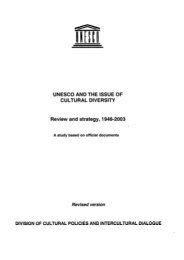

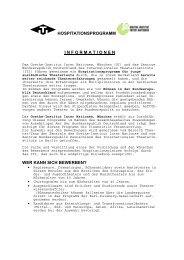

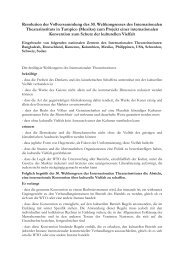
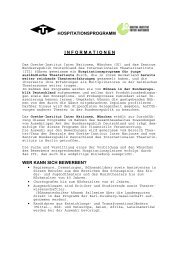
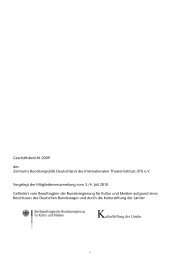
![Geschäftsbericht 2010 [pdf 2 MB] - ITI](https://img.yumpu.com/4380475/1/184x260/geschaftsbericht-2010-pdf-2-mb-iti.jpg?quality=85)